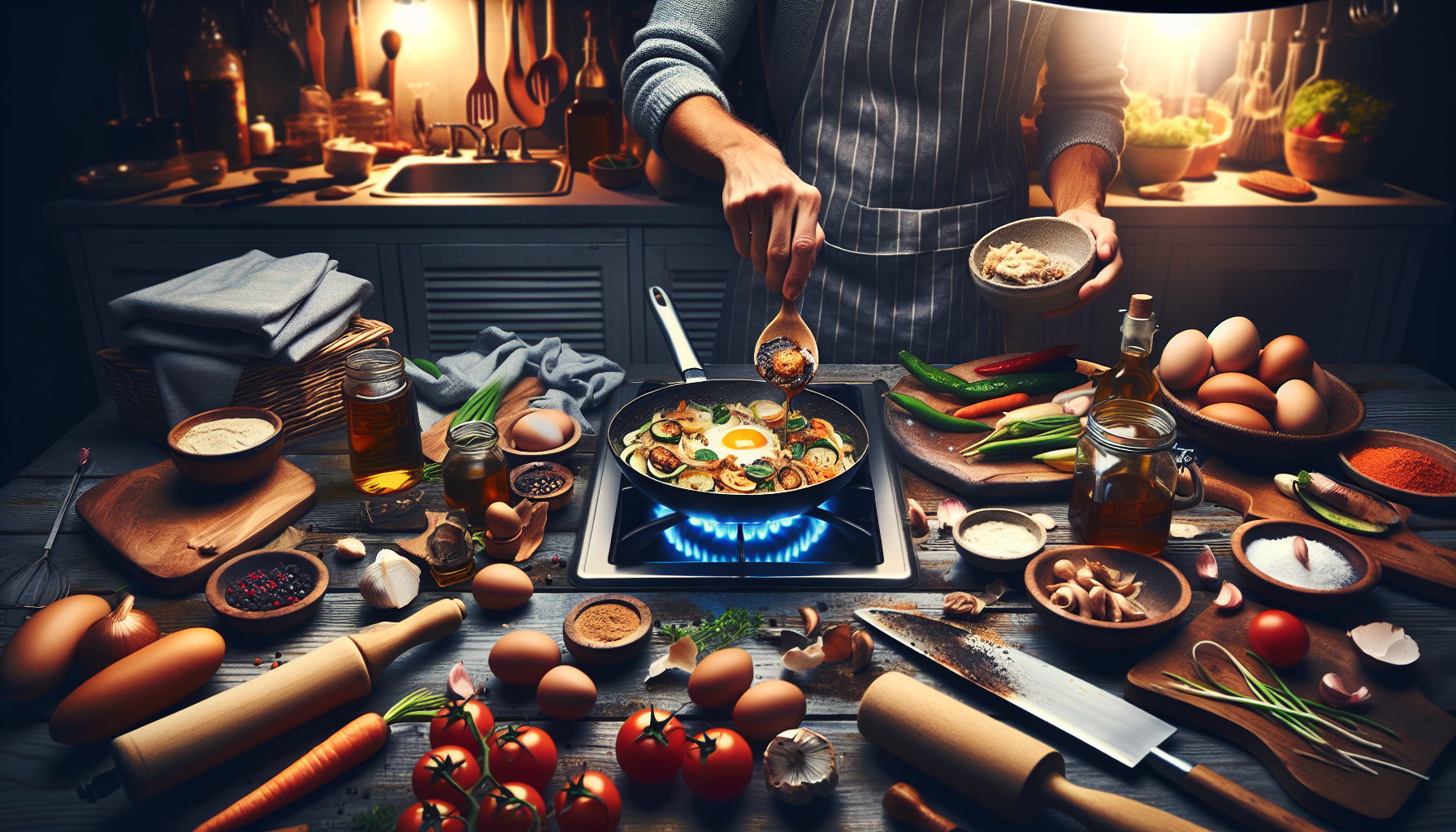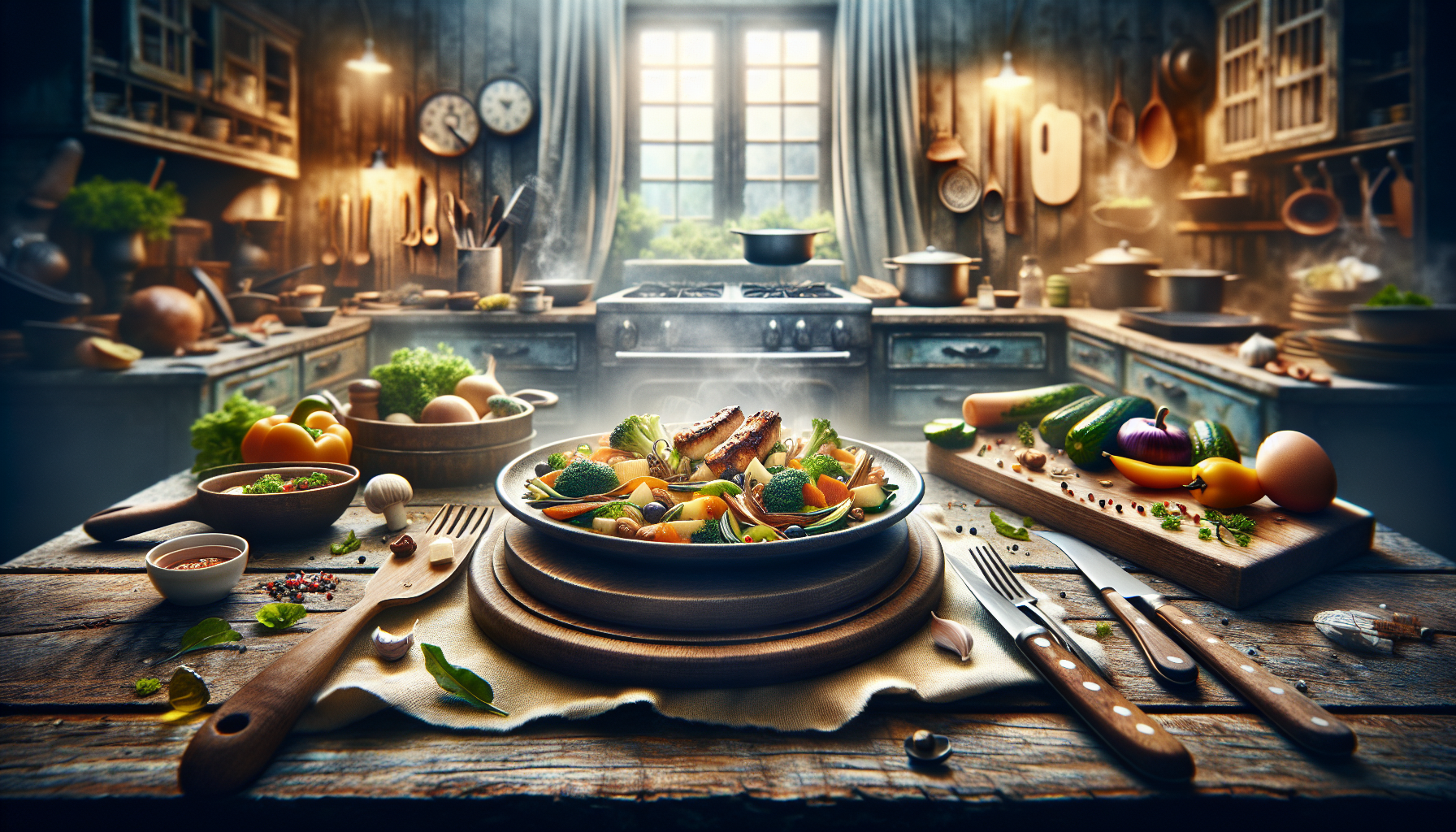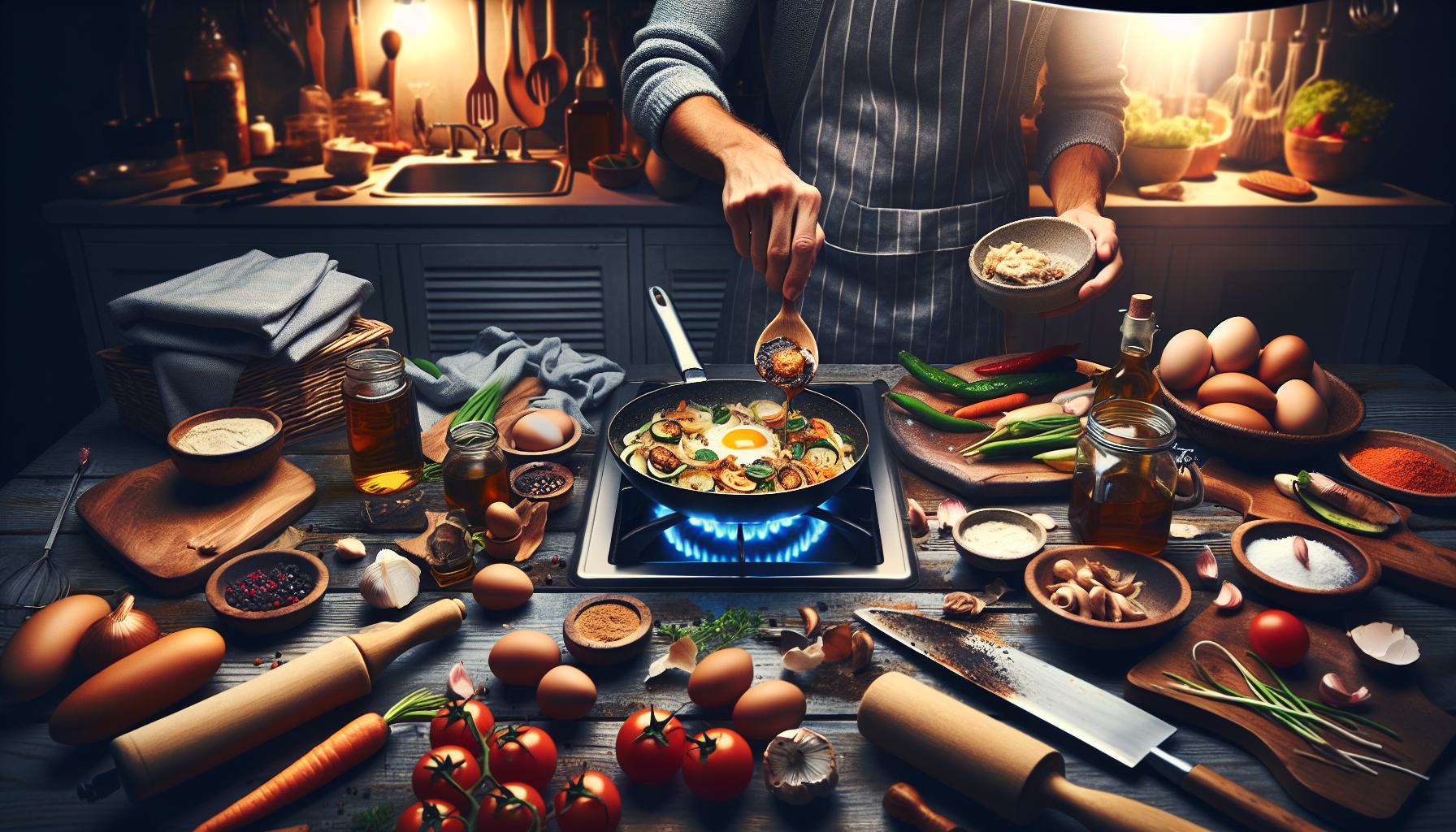Cooking is not just about nourishing your body; it’s a powerful tool to connect with yourself and explore your relationship with food. In this article, we’ll explore the intriguing influence of solo cooking on your connection with food. From igniting creativity to fostering mindfulness, solo cooking can become a transformative process that alters the way you perceive and appreciate the nourishment on your plate. So grab your apron and let’s embark on a culinary journey that goes beyond the flavors and into the depths of your personal food symphony.
The Benefits of Solo Cooking
Increased Self-Reliance
Solo cooking allows you to become more self-reliant in the kitchen. When you cook for yourself, you no longer have to rely on others to provide you with meals. You have the power to create delicious and nutritious dishes on your own, giving you a sense of independence and self-sufficiency.
Enhanced Creativity
Cooking alone gives you the freedom to explore your culinary creativity. You can experiment with different flavor combinations, try out new ingredients, and even create your own signature dishes. Without the input or influence of others, you have the opportunity to let your imagination run wild in the kitchen.
Improved Time Management
When you are cooking solo, you have complete control over the timing of your meals. You can prepare your dishes at your own pace and according to your own schedule. This allows you to prioritize your time effectively and make sure that you are not rushing through the cooking process. You can take the time to savor each step and truly enjoy the experience.
Opportunity for Self-Reflection
Cooking alone provides a chance for self-reflection. As you prepare your meals, you have time to think and process your thoughts. It can be a meditative experience, allowing you to be present in the moment and take a break from the busyness of everyday life. This self-reflection can also extend beyond the cooking process and lead to a deeper understanding of yourself and your relationship with food.
Understanding Your Preferences
Exploring New Flavors
When you cook solo, you have the freedom to explore new flavors and cuisines that you may not have tried before. You can experiment with different spices, herbs, and seasonings to create unique and exciting taste profiles. By stepping out of your comfort zone and trying new flavors, you can expand your palate and discover a whole new world of culinary delights.
Discovering Personal Food Preferences
Solo cooking allows you to discover your personal food preferences without the influence or compromise of others. You can prepare meals that cater to your specific tastes, whether that means indulging in your favorite comfort foods or exploring healthier options that align with your dietary goals. By cooking for yourself, you have the opportunity to truly understand what foods bring you joy and satisfaction.
Experimenting with Cooking Techniques
Cooking alone gives you the freedom to try out different cooking techniques and methods. Whether you want to perfect your sautéing skills, experiment with baking, or delve into the art of grilling, solo cooking provides a safe space for you to explore and improve your culinary prowess. You can challenge yourself and push your boundaries, all while enjoying the delicious results of your experiments.
Learning about Portion Control
Cooking for yourself allows you to develop a better understanding of portion control. You can tailor your meals to meet your specific nutritional needs and learn to listen to your body’s hunger and fullness cues. By taking ownership of your portion sizes, you can foster a healthier relationship with food and make more mindful choices when it comes to nourishing your body.

Developing a Healthy Relationship with Food
Mindful Eating
Solo cooking encourages mindful eating practices. When you prepare your own meals, you have the opportunity to fully engage with the cooking process and appreciate each ingredient that goes into your dish. This mindfulness extends to the act of eating as well, as you can savor each bite and truly enjoy the flavors and textures of your homemade creations. This mindful approach to food can lead to a more positive and balanced relationship with what you eat.
Reduced Reliance on Processed Foods
By cooking for yourself, you can reduce your dependence on processed foods. Instead of relying on pre-packaged meals or take-out, you have the ability to create homemade dishes using fresh and whole ingredients. This shift towards cooking from scratch allows you to have better control over the quality and nutritional value of your meals. By reducing your intake of processed foods, you can support your overall health and well-being.
Improved Nutrition Choices
Solo cooking gives you the power to make informed and nutritious food choices. You can prioritize fresh fruits and vegetables, lean proteins, and whole grains, ensuring that your body receives the necessary nutrients for optimal health. By cooking for yourself, you can also tailor your meals to accommodate any specific dietary requirements or preferences you may have, whether that be a vegetarian, gluten-free, or dairy-free lifestyle.
Gaining Control over Food Decisions
When you cook solo, you gain a sense of control and autonomy over your food decisions. You can choose the ingredients, flavors, and cooking methods that align with your personal preferences and health goals. This control over your food choices can empower you to make positive decisions that support your overall well-being and enable you to feel confident in the nourishment you provide for yourself.
Cultivating Independence
Building Confidence in the Kitchen
Solo cooking allows you to build confidence in the kitchen. As you gain experience and develop your cooking skills, you become more comfortable and proficient in preparing meals. Through trial and error, you learn to trust your instincts and make adjustments based on your own taste preferences. This growing confidence not only benefits your culinary abilities but also extends to other areas of your life as you realize your capabilities and resilience.
Mastering Basic Cooking Skills
Cooking for yourself provides an opportunity to master basic cooking skills. Whether it’s learning how to chop vegetables, sauté onions, or bake a simple cake, solo cooking allows you to practice and perfect these fundamental techniques. As you become more adept in the kitchen, you expand your culinary repertoire and gain the necessary skills to tackle more complex recipes in the future.
Feeling Accomplished and Self-Sufficient
When you cook solo, each completed dish becomes an achievement in itself. The sense of accomplishment and self-sufficiency that comes from creating a delicious meal from scratch is unparalleled. With every successful recipe, you gain a deeper appreciation for your own abilities and resourcefulness. This feeling of accomplishment extends beyond the boundaries of the kitchen and empowers you to tackle challenges in other aspects of your life.

Embracing Creativity
Creating Unique Flavor Combinations
Solo cooking allows you to unleash your creativity and experiment with unique flavor combinations. Without the need to cater to anyone else’s preferences, you can blend ingredients and spices in unexpected ways, resulting in innovative and exciting tastes. This artistic freedom in the kitchen allows you to express your individuality and create dishes that truly reflect your personal style and culinary flair.
Experimenting with Ingredients
Cooking alone gives you the opportunity to experiment with different ingredients. You can try out exotic fruits or vegetables, incorporate herbs and spices you’ve never used before, or experiment with alternative grains and proteins. By stepping outside of your culinary comfort zone, you expand your palate and challenge yourself to discover new and interesting flavors.
Improvising when Necessary
Solo cooking often requires you to think on your feet and improvise. If you find yourself without a certain ingredient or cooking tool, you can rely on your creativity to find suitable alternatives. This ability to adapt and make do with what you have fosters resilience and resourcefulness in the kitchen. It also encourages you to think outside the box and find new approaches to cooking and problem-solving.
Developing Signature Dishes
When you cook solo, you have the opportunity to develop your own signature dishes. These are the meals that reflect your unique style and taste preferences. By experimenting with different recipes and flavors, you can create dishes that become your culinary trademarks. Whether it’s a special marinade, a secret sauce, or a combination of bold flavors, your signature dishes become a reflection of your personal culinary identity.
Becoming Health-Conscious
Cooking Balanced Meals
Cooking for yourself allows you to prioritize balanced meals. You have the freedom to choose a variety of foods from different food groups, ensuring that your body receives the necessary nutrients for optimal health. By incorporating a balance of lean proteins, vegetables, whole grains, and healthy fats into your meals, you can support your overall well-being and maintain a healthy lifestyle.
Monitoring Portion Sizes
Solo cooking provides an opportunity to develop a better understanding of portion control. By planning and preparing your own meals, you have control over the size of your servings. This allows you to listen to your body’s hunger and fullness cues and make mindful choices about how much food you consume. By monitoring portion sizes, you can maintain a healthy weight, support your digestion, and prevent overeating.
Reducing the Consumption of Unhealthy Ingredients
Cooking for yourself gives you the power to reduce the consumption of unhealthy ingredients in your meals. You can choose to limit or omit ingredients high in saturated fats, added sugars, and sodium, which are commonly found in processed foods and restaurant meals. By focusing on fresh and whole ingredients, you can create meals that are nourishing and supportive of your long-term health.
Making Informed Food Choices
Solo cooking allows you to make informed food choices based on your individual nutritional needs and preferences. You can research and understand the nutritional content of the ingredients you use, ensuring that you are providing your body with the necessary nutrients it needs. By being conscious of your food choices, you can support your overall health and well-being and make informed decisions that align with your personal goals.
Boosting Confidence in the Kitchen
Learning to Trust Your Culinary Skills
When you cook alone, you have the chance to develop and trust your culinary skills. Through practice and experience, you become more knowledgeable and proficient in the kitchen. As you see the positive results of your efforts and receive compliments on your meals, you gain confidence in your abilities and become more willing to take on new culinary challenges.
Adapting Recipes to Personal Taste
Cooking for yourself allows you to adapt recipes to suit your personal taste preferences. You can modify ingredient quantities, adjust seasoning levels, or even add your own unique twists to existing recipes. This customization gives you the freedom to create meals that align with your individual palate, ensuring that each dish is tailored to your liking.
Tackling Culinary Challenges
Solo cooking provides an opportunity to tackle culinary challenges head-on. Whether it’s mastering a difficult technique, attempting a complex recipe, or cooking for a large gathering, cooking alone gives you the space and time to focus on the task at hand. By successfully navigating these challenges, you build resilience and confidence not only in the kitchen but also in other areas of your life.
Appreciating the Connection with Food
Developing an Understanding of Ingredients
When you cook solo, you develop a deeper understanding of the ingredients you use. As you handle, prepare, and taste each ingredient, you gain insight into their flavors, textures, and culinary properties. This knowledge allows you to make more informed decisions when selecting ingredients and create meals that highlight the natural qualities of each component.
Learning about Food Origins
Solo cooking provides an opportunity to learn about the origins of the food you consume. Whether it’s researching the source of a particular fruit or vegetable or learning about traditional cooking methods from different cultures, cooking alone allows you to appreciate the diverse and rich history of food. This understanding of food origins adds depth to your culinary experience and fosters a greater connection to the global food community.
Appreciating the Cultural Significance of Food
When you cook for yourself, you have the chance to appreciate the cultural significance of different foods and recipes. By exploring dishes from various cultures, you can gain an understanding of the traditions, values, and histories associated with them. This cultural appreciation not only broadens your knowledge but also encourages a sense of respect and curiosity for different culinary traditions.
Exploring Food Ethics
Solo cooking opens the door to exploring food ethics and making conscious choices about the ingredients you use. You have the opportunity to research and support ethical farming practices, sustainable fishing methods, and local food systems. By engaging with these issues, you can contribute to a more sustainable and responsible food industry while deepening your own understanding and appreciation of the environmental and social impacts of food production.
Enjoying the Therapeutic Aspect
Finding Relaxation in the Cooking Process
Cooking alone can be a therapeutic and relaxing experience. The act of chopping, stirring, and creating in the kitchen can be a form of meditation, allowing you to focus your mind and find solace from the stresses of daily life. This tranquility in the cooking process can provide a sense of calm and rejuvenation, promoting overall well-being and mental health.
Reducing Stress through Expressive Cooking
Expressive cooking is a form of self-expression and a way to reduce stress. By immersing yourself in the creative process of cooking, you can channel your emotions and release tension. The act of transforming raw ingredients into a delicious meal can be a cathartic experience, providing a healthy outlet for emotional expression and a means of coping with everyday challenges.
Creating an Outlet for Creativity and Self-Expression
Solo cooking offers a unique outlet for creativity and self-expression. By experimenting with ingredients, flavors, and presentation, you can unleash your artistic side and create beautiful and delicious works of art. Each dish becomes a canvas for your imagination and a reflection of your personal style. This creative expression not only brings joy and fulfillment but also enhances the overall dining experience.
Creating Food as an Act of Self-Care
Cooking Nutritious Meals for Personal Well-being
Cooking for yourself allows you to prioritize your personal well-being by preparing nutritious meals. You have the ability to choose ingredients that nourish your body and support your overall health. By incorporating a balance of vitamins, minerals, and macronutrients into your meals, you can enhance your energy levels, improve your mood, and support your physical and mental well-being.
Pampering Yourself with Favorite Foods
Solo cooking gives you the opportunity to pamper yourself with your favorite foods. Whether it’s treating yourself to a decadent dessert or indulging in a comfort food classic, cooking for yourself allows you to cater to your own desires and preferences. By taking the time to indulge in your favorite dishes, you can show yourself love and appreciation, enhancing your overall sense of well-being.
Fostering Self-Compassion through Nourishment
Cooking for yourself is an act of self-compassion and nourishment. By taking the time to prepare meals that satisfy your cravings and nourish your body, you show yourself love and care. This intentional act of nourishing yourself can boost your self-esteem, enhance your body image, and foster a positive relationship with food and your own well-being. Through solo cooking, you can cultivate a deeper sense of self-compassion and appreciation for yourself.
